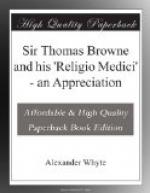ON HELL
Men commonly set forth the torments of hell by fire, and the extremity of corporeal afflictions, and describe hell in the same method that Mahomet doth heaven. This indeed makes a noise, and drums in popular ears; but if this be the terrible piece thereof, it is not worthy to stand in diameter with heaven, whose happiness consists in that part that is best able to comprehend it, that immortal essence, that translated divinity and colony of God, the soul. Surely, though we place hell under earth, the devil’s walk and purlieu is about it: men speak too popularly who place it in those flaming mountains, which to grosser apprehensions represent hell. The heart of man is the place the devils dwell in. I feel sometimes a hell within myself; Lucifer keeps his court in my breast; Legion is revived in me. There are as many hells as Anaxagoras conceited worlds. There was more than one hell in Magdalene, when there were seven devils; for every devil is a hell unto himself. He holds enough of torture in his own ubi, and needs not the misery of circumference to afflict him. And thus, a distracted conscience here, is a shadow or introduction unto hell hereafter. Who can but pity the merciful intention of those hands that do destroy themselves? The devil, were it in his power, would do the like; which being impossible, his miseries are endless, and he suffers most in that attribute wherein he is impassible—his immortality.
I thank God that (with joy I mention it) I was never afraid of hell, nor never grew pale at the description of that place. I have so fixed my contemplations on heaven, that I have almost forgot the idea of hell, and am afraid rather to lose the joys of the one, than endure the misery of the other—to be deprived of them is a perfect hell, and needs, methinks, no addition to complete our afflictions. That terrible term hath never detained me from sin, nor




